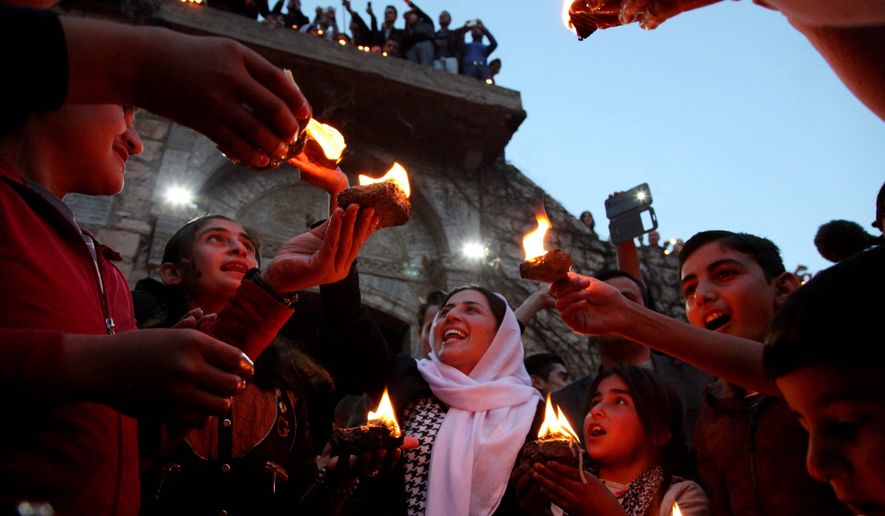While the Islamic State has committed horrific acts, including beheadings, against Christians and Muslims, analysts say other minority religions that don’t believe in the Bible may face even worse treatment under the terrorists’ rule.
Christians in Mosul, Iraq, last year were given the choice to pay a tax for their religion, leave the city, or be put to death. All chose to flee the city where a Christian community has lived for thousands of years.
But groups who are not so-called “people of the Book,” like the Yazidis, wouldn’t be given that choice, said Jim Phillips, a senior research fellow for Middle Eastern affairs at the Heritage Foundation.
“Those they would put the men to death and take women and girls as slaves,” Mr. Phillips said. “It’s a very harsh reality that basically discriminates against everybody who does not actually support their radical Islamist goals.”
Even Muslims of other sects have faced violence for not supporting the strict interpretation of the Islamic faith held by members of the terrorist group.
“If they get hold of Shia, they’ll kill them. If they got hold of Sunnis, they’ll kill them,” said Akbar Ahmed, former Palestinian ambassador to the United Kingdom. “Really, when you have this kind of chaotic violence, anyone who is in their sights becomes a victim. There is no law, there is no order.”
SEE ALSO: Tariq bin Tahar al-‘Awin al-Harzi, Islamic State leader, killed in airstrike
Analysts stressed that it is difficult to pinpoint exact brutalities inflicted by the Islamic State because most minorities have fled and very little reliable information from those living in terrorist-controlled areas is getting out, while Islamic State reports are likely exaggerated.
But they said religious minorities are treated like second-class citizens, cannot openly practice their religion, are sometimes forced to pay fines, and often face attacks on their places of worship, death or sexual slavery.
Persecution of religious minorities in the region is nothing new. Conditions around Iraq for years have been “extraordinarily grave” for Christians, who were frequently the target of terrorist attacks by al Qaeda in Iraq, according to Daveed Gartenstein-Ross, a senior fellow at the Foundation for Defense of Democracies.
Despite that, he said the “level of fear is greater now” for religious groups under Islamic State rule than it was under al Qaeda.
“The mass exodus of Christians that we saw in Mosul — you didn’t see a similar mass exodus under the predecessor of the Islamic State, al Qaeda in Iraq, which also conquered Mosul,” Mr. Gartenstein-Ross said. “In no way can they argue they treated Christians well, but under the Islamic State, the number of Christians got reduced to approximately zero, they fled en masse.”
The Islamic State’s persecution of Christians and other religious minorities could have consequences around the world, said Farah Pandith, a former State Department special representative to Muslim communities.
SEE ALSO: New Ebola case reported in Liberia, weeks after nation declared virus-free
By using social media and other digital tools to reach Muslim millennials worldwide, the Islamic State, also known as ISIS, is broadcasting its commitment to eradicate minorities around the globe in a domino effect with impact far beyond its territory in Iraq and Syria, Ms. Pandith said.
“Those that sympathize with ISIS and those that are on the conveyor belt toward extremism will see the way in which minorities are treated as a rule book for how they must behave,” said Ms. Pandith, who now serves as an adjunct senior fellow at the Council of Foreign Relations. “Those young people who can’t make their way to Syria or Iraq are important for us to understand. They will be impacted by the ideology of ISIS and do things in their own environment that echo and mirror ideology of ISIS.”
In addition to killing and driving away religious minorities, the terrorists also are destroying places of worship, monuments and other ancient religious symbols to wipe out any evidence of what was there before they took over, Ms. Pandith said.
“They are removing historic memory by decimating sites. Within one generation, people will not remember where things are, what they were, that there is any evidence,” she said. “Removing people from the land they historically for hundreds of years have lived on, they have no connectivity to the land, no connectivity to the place, and you cannot claim to belong if you’re separated from it.”
Mr. Gartenstein-Ross said that the destruction of the relics and societies is a loss that all people should care about.
“You have centuries of old Christian churches that are part of the world’s cherished heritage, some of these places overrun by Islamic State,” he said. “Seeing a community of religious minorities that was once an important part of Iraqi society wiped out of this area that as their home is something that should disturb anybody.”
“The Christians, the Yazidis — they were literally just there living their lives, then a militant group sweeps in and targets them because they believe something different,” he said.
• Jacqueline Klimas can be reached at jklimas@washingtontimes.com.




Please read our comment policy before commenting.